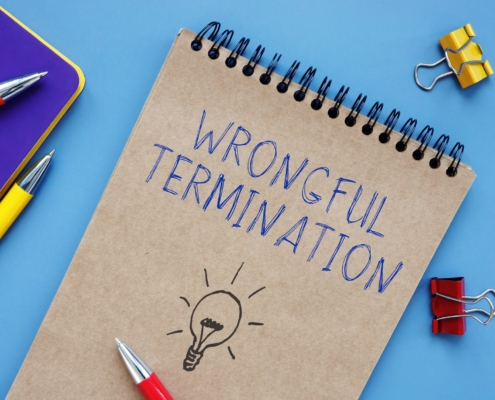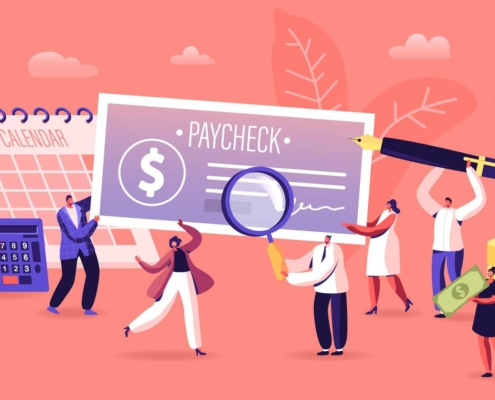What Happens if My Paycheck is Late in California?
Here are some key details on what happens if paychecks are late in California:
- California labor laws require that employees must be paid on regular paydays designated in advance by the employer. There is no specific grace period for late paychecks under California law. Understanding your rights is crucial when your paycheck is late in California.
- If an employer knowingly and intentionally fails to pay the wages due, the employee can then file a wage claim with the California Labor Commissioner’s Office. This can seek the payment of the unpaid wages as well as the waiting time penalties. When a paycheck is late, California labor laws provide specific protections for employees.
- Waiting time penalties accrue at an employee’s regular rate of pay for up to 30 days that the wages go unpaid. So the employer can owe the regular wages plus a full day’s wages for each day late, up to 30 days. The late paycheck penalty in California can accumulate quickly, impacting employers.
- Even if the late payment was an accident or for reasons out of the employer’s control, waiting time penalties can still apply. An employer is generally liable regardless of the fault. The stress of a paycheck being late can be mitigated by knowing your legal options.
- In addition to filing an administrative wage claim, an employee can file a civil lawsuit against the employer for the nonpayment of wages. This allows the employee to potentially recover the unpaid wages, waiting time penalties, interest, plus litigation costs and attorneys’ fees. Understanding how the late paycheck penalty works is vital for both employers and employees.
So in short – the employee can seek administrative complaints, the penalties on top of unpaid wages, a private lawsuit, and also other recourse even if a paycheck from their employer is late under California employment laws. Please contact our employment lawyer for workers when you’re saying, “I didn’t get my paycheck on payday.”
Is it Illegal to Not Get Paid on Payday in California?
Yes, it is generally illegal for employers in California to not pay the employees on the established payday. Here are some key details on payday laws in California:
- Employers must establish regular paydays and pay employees all wages owed on those scheduled paydays. There must be no more than 30 days between the regular pay periods. Employees should document every instance when their paycheck is late as evidence.
- If an employer does not pay an employee in full on the scheduled payday, that is considered a serious violation and can trigger penalties such as waiting time penalties for non-payment. A late paycheck in California can lead to specific legal consequences for employers.
- There are some exceptions – for example, if there is a clerical or inadvertent computer error and the employer pays the wages within a few days of learning of the issue. Major payroll errors could still lead to some penalties however. The frequency of a late paycheck might be a sign of a company’s financial health.
- California wage law also requires the paying of final wages owed at the termination for involuntary terminations and within 72 hours for voluntary resignations. Employees have the right to pursue action if they receive a late paycheck.
So in summary, except in very limited situations mostly related to accidental oversights and possibly some other non-compounding over situation, employers are required to pay all wages owed on the established paydays. Failing to do so does violate the California labor law. Employees facing issues getting paid on payday can file wage claims with the state Labor Commissioner’s office. Understanding the reasons behind a late paycheck can help in resolving the issue.
What To Do if Your Employer Doesn’t Pay You on Time
Here are some tips on what to do if your employer doesn’t pay you on time:
- Speak to your manager. Politely ask your manager when can you expect to receive your pay. There may be an innocent explanation like a processing error. Give them a reasonable chance to fix it before taking any further steps. When my paycheck is late, it creates a ripple effect on my financial responsibilities.
- Review your company’s policies. Many companies have policies around the pay schedules and procedures for resolving the missed or late payments. Check if such a policy exists and follow the steps outlined. California’s laws are stringent regarding a late paycheck for employees.
- Send a formal written request. If the issue persists, put your request for your unpaid wages in writing via email or letter. Be sure to state when you should have been paid and how much is owed. Keep copies for yourself. A late paycheck can disrupt your budgeting and financial planning.
- Contact your state labor department. If there is still no response after a written request, file a wage claim with your state labor department or agency. They can contact the employer on your behalf regarding the unpaid wages. Employees should keep records of every late paycheck for future reference.
- Consult an employment lawyer. For prolonged or willful nonpayment issues, an employment lawyer can really help you explore your legal options, which may include filing a lawsuit against the employer to recover back pay. The legal implications of issuing a late paycheck are severe for employers.
- File a complaint with the U.S. Dept of Labor. If there are violations of the federal wage laws, you can file a complaint regardless of whether you work for a private, public, or government employer. Consulting with a labor attorney can be beneficial when dealing with a late paycheck.
The key is to act promptly in seeking what is rightfully owed to you. Start with the company first and then escalate to official actions as needed. The late paycheck penalty serves as a deterrent against delayed wage payments.
Late Paycheck Laws in California
Here are some key details about late paycheck laws in California:
- Employees must be paid all wages owed, including their final paycheck, on time as specified by their employer’s designated paydays. For employees who quit or are fired, the final pay is due within 72 hours. A paycheck being late repeatedly could indicate a larger issue with the employer.
- If an employer knowingly and willfully fails to pay final wages on time, the wages of the employee shall continue as a penalty until paid, for up to 30 days. The impact on personal finances when a paycheck is late can be significant.
- An employee can file a wage claim with the California Labor Commissioner’s Office if they don’t receive their final paycheck on time. This complaint must be filed within three years for any violation of the final paycheck laws. Employers must be mindful of the late paycheck penalty to avoid legal trouble.
- If the Labor Commissioner determines the employer violated final pay laws, the employer may be ordered to pay the employee the waiting time penalty, which is the employee’s daily rate of pay for each day the wages are late, up to 30 days. Addressing the issue directly with your employer is advisable if your paycheck is late.
- Employees who win a wage claim can also be awarded interest on the unpaid wages and be reimbursed for costs and legal fees. The severity of a late paycheck penalty reflects the importance of timely wage payment.
So in summary, California law imposes many penalties on employers who knowingly don’t pay their final wages in a prompt manner to discourage this unlawful practice. Employees have many avenues through the Labor Commissioner to pursue unpaid final wages. Employees should be aware of their rights regarding the late paycheck penalty.
What is Penalty Pay when a Paycheck is Late?
Penalty pay penalty in California is when a paycheck is late refers to the additional compensation that some states require employers to pay employees if their paycheck is late by a certain number of days. Here are some key points about penalty pay for late paychecks:
- Requirements vary by state – some states require penalty pay for late paychecks, while other states do not. Common requirements are paying a penalty if a paycheck is more than 30 days late. The late paycheck penalty is calculated based on the employee’s regular rate of pay.
- Where required, the daily penalty is usually a percentage of the unpaid wages. For example, the penalty might be 5% of the unpaid wages per day late. Recovering a late paycheck penalty can be a part of the wage claim process.
- Penalty pay is capped at a certain number of days in most states. For example, penalties may stop accruing after 15-30 days. The late paycheck penalty is designed to protect employees from financial harm.
- The penalties paid to the employee are in addition to the actual wages owed by the employer. It is a punishment for the employer failing to pay in a timely manner. In some cases, the late paycheck penalty may exceed the actual wages owed.
- Some states allow exceptions if the lateness is due to conditions outside the employer’s control. However, the burden is generally on the employee to prove this. Negotiating with your employer is an option when faced with a late paycheck.
So in summary, penalty pay is an additional sum owed to the employees to incentivize employers to pay wages on time when required by state law. Employees should check their specific state laws to determine if penalty pay applies to their late paychecks. The penalties paid to the employee are in addition to the actual wages owed by the employer. It is a punishment for the employer failing to pay in a timely manner.
Can I Sue My Employer for Not Paying Me on Time in California?
Yes, you may be able to sue your employer in California for not paying you on time. Here are some key things to know:
- California labor laws require that employees must be paid at least twice per the calendar month on designated paydays. There are very many penalties for late payment. I always contact HR immediately if my paycheck is late to resolve the issue.
- You can file a wage claim with the California Labor Commissioner’s Office for any unpaid wages. This includes the late payment of wages. They will investigate and make a quick judgment to get you your unpaid wages. My paycheck being late can be a sign of administrative issues within the company.
- You can also file a lawsuit against your employer. California law allows employees to sue for unpaid wages, interest, and also the cost of the suit. You may also be awarded a penalty for each pay period you were not paid on time. The frustration of my paycheck being late is compounded by the lack of communication.
- Before suing them, you should send a formal demand letter to your employer requesting the payment. This puts them on notice and gives them a chance to pay you before any lawsuit. I keep a detailed record every time my paycheck is late for future reference.
- Keep good records of all your hours worked, pay stubs showing late or missing payments, and make sure to demand letters you sent. These will help to prove your claim. My paycheck is late more often than it should be, raising concerns about my employer’s reliability.
- Consult with an employment lawyer to understand all of your options. A lawsuit has strict deadlines and procedural requirements. A lawyer can advise if a lawsuit makes sense in your situation. The anxiety caused by my paycheck being late affects my work performance.
The best approach depends on the circumstances of your very own case. With good documentation, you can recover the unpaid wages plus additional penalties from an employer who does not pay on time. Seeking legal recourse becomes an option when my paycheck is consistently late.































